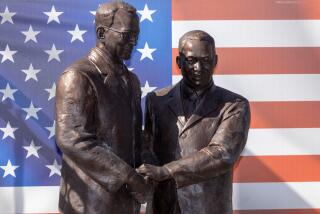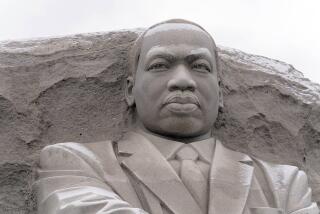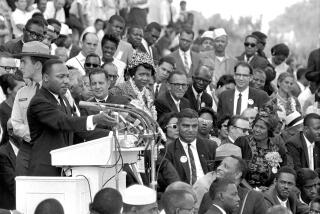Older Generations Pass On the Legacy and the Dream
Evelyn Montgomery was out registering black voters on that April day in 1968 when civil rights leader Dr. Martin Luther King Jr. was slain in Memphis. On Monday, she was part of four generations of a family that attended a program commemorating his achievements.
Among members of her family attending the Dr. Martin Luther King Jr. Awareness Day celebration of the San Fernando Valley chapter of the NAACP in Pacoima was Montgomery’s 83-year-old mother, Josephine Scovell, who remembered how things used to be before the civil rights movement took root in the 1960s.
And there was Scovell’s great-granddaughter, Niki Hamilton, 13--not yet born when King died--who said it was her great-grandmother who first told her about the civil rights leader and how “he was fighting for freedom.”
Montgomery, 62, and her relatives were among more than 300 people who marked King’s birthday at the Pacoima Community Center.
The celebration, marked by songs, speeches and dramatic presentations, was the seventh annual such commemoration. But this was the first year that King’s birthday was celebrated as a national holiday.
Another event, a Southern Christian Leadership Conference-sponsored march along Van Nuys Boulevard, recalled the tradition of the famous King-led marches in the mid-1960s.
The Rev. Jeffrey Joseph, an organizer of the march, said the event, which drew about 75 people, “re-emphasizes that we as a people are overcoming and that we accept that Martin Luther King lived and died for our freedom.”
At the Pacoima Community Center, Evelyn Montgomery’s husband, Thomas, 65, echoed that sentiment.
“This kind of gathering rekindles the memory of the older people, and brings back some of their memories of the pain and suffering,” said Thomas Montgomery, vice president of the local chapter of the National Assn. for the Advancement of Colored People.
“The young people don’t realize what we’ve been through. We need to get them to take advantage of the doors that have been opened for them” by King and others, Thomas Montgomery said.
His mother-in-law, Scovell, agreed. “A lot of them don’t know about sitting on the back of the bus,” she said.
“Things were a whole lot different when I was young; there were a lot of places you couldn’t go,” said Scovell, recalling the segregated restaurants, buses and even cemeteries of her native New Orleans.
But she said she believes that young people have learned a lot from the legacy of King.
“The children have got more sense than they did a long time ago,” Scovell said. “They wouldn’t take what we took.”
More to Read
Get the L.A. Times Politics newsletter
Deeply reported insights into legislation, politics and policy from Sacramento, Washington and beyond. In your inbox three times per week.
You may occasionally receive promotional content from the Los Angeles Times.










